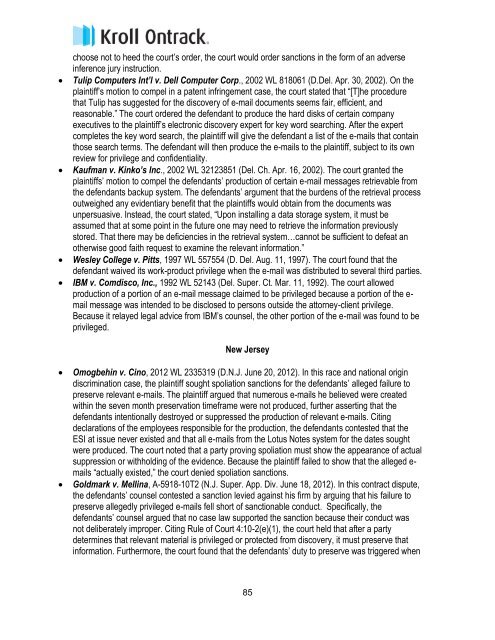Electronic Discovery and Computer Forensics Case List - Kroll Ontrack
Electronic Discovery and Computer Forensics Case List - Kroll Ontrack
Electronic Discovery and Computer Forensics Case List - Kroll Ontrack
You also want an ePaper? Increase the reach of your titles
YUMPU automatically turns print PDFs into web optimized ePapers that Google loves.
choose not to heed the court’s order, the court would order sanctions in the form of an adverse<br />
inference jury instruction.<br />
� Tulip <strong>Computer</strong>s Int’l v. Dell <strong>Computer</strong> Corp., 2002 WL 818061 (D.Del. Apr. 30, 2002). On the<br />
plaintiff’s motion to compel in a patent infringement case, the court stated that “[T]he procedure<br />
that Tulip has suggested for the discovery of e-mail documents seems fair, efficient, <strong>and</strong><br />
reasonable.” The court ordered the defendant to produce the hard disks of certain company<br />
executives to the plaintiff’s electronic discovery expert for key word searching. After the expert<br />
completes the key word search, the plaintiff will give the defendant a list of the e-mails that contain<br />
those search terms. The defendant will then produce the e-mails to the plaintiff, subject to its own<br />
review for privilege <strong>and</strong> confidentiality.<br />
� Kaufman v. Kinko’s Inc., 2002 WL 32123851 (Del. Ch. Apr. 16, 2002). The court granted the<br />
plaintiffs’ motion to compel the defendants’ production of certain e-mail messages retrievable from<br />
the defendants backup system. The defendants’ argument that the burdens of the retrieval process<br />
outweighed any evidentiary benefit that the plaintiffs would obtain from the documents was<br />
unpersuasive. Instead, the court stated, “Upon installing a data storage system, it must be<br />
assumed that at some point in the future one may need to retrieve the information previously<br />
stored. That there may be deficiencies in the retrieval system…cannot be sufficient to defeat an<br />
otherwise good faith request to examine the relevant information.”<br />
� Wesley College v. Pitts, 1997 WL 557554 (D. Del. Aug. 11, 1997). The court found that the<br />
defendant waived its work-product privilege when the e-mail was distributed to several third parties.<br />
� IBM v. Comdisco, Inc., 1992 WL 52143 (Del. Super. Ct. Mar. 11, 1992). The court allowed<br />
production of a portion of an e-mail message claimed to be privileged because a portion of the email<br />
message was intended to be disclosed to persons outside the attorney-client privilege.<br />
Because it relayed legal advice from IBM’s counsel, the other portion of the e-mail was found to be<br />
privileged.<br />
New Jersey<br />
� Omogbehin v. Cino, 2012 WL 2335319 (D.N.J. June 20, 2012). In this race <strong>and</strong> national origin<br />
discrimination case, the plaintiff sought spoliation sanctions for the defendants’ alleged failure to<br />
preserve relevant e-mails. The plaintiff argued that numerous e-mails he believed were created<br />
within the seven month preservation timeframe were not produced, further asserting that the<br />
defendants intentionally destroyed or suppressed the production of relevant e-mails. Citing<br />
declarations of the employees responsible for the production, the defendants contested that the<br />
ESI at issue never existed <strong>and</strong> that all e-mails from the Lotus Notes system for the dates sought<br />
were produced. The court noted that a party proving spoliation must show the appearance of actual<br />
suppression or withholding of the evidence. Because the plaintiff failed to show that the alleged emails<br />
“actually existed,” the court denied spoliation sanctions.<br />
� Goldmark v. Mellina, A-5918-10T2 (N.J. Super. App. Div. June 18, 2012). In this contract dispute,<br />
the defendants’ counsel contested a sanction levied against his firm by arguing that his failure to<br />
preserve allegedly privileged e-mails fell short of sanctionable conduct. Specifically, the<br />
defendants’ counsel argued that no case law supported the sanction because their conduct was<br />
not deliberately improper. Citing Rule of Court 4:10-2(e)(1), the court held that after a party<br />
determines that relevant material is privileged or protected from discovery, it must preserve that<br />
information. Furthermore, the court found that the defendants’ duty to preserve was triggered when<br />
85

















